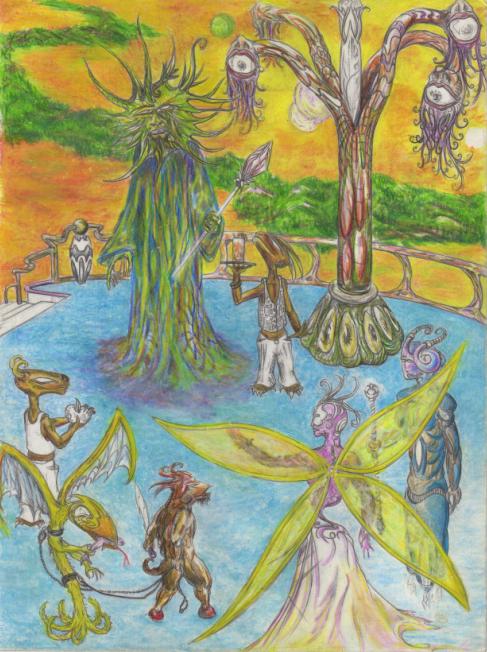|
|||||||||||||
|
By Punkerslut
Introduction In my essay, "Mind-Altering Substances," I gave a defense of a person's right to use drugs. That is, to say, if a person wishes to use drugs, or wishes to abstain from drugs, it is entirely their personal choice. The premise to this essay was freedom and liberty. You should not infringe another person's right to do what they like, any more than they should infringe upon your right to do what you like. What I wrote in that essay was a political and philosophical defense of our rights as individuals. There was, of course, another tint of personality to the essay. In many parts, I recommended mind-altering substances to those who were willing to change their perspective and see things in a new light. So, not only was it a defense of a person's right to use or not use drugs, but it was a promotion of what things may come from drug use. I didn't get too much into that part, though. It was largely just a defense of a person's right to drugs. It didn't deal with drug culture, or psychonaut culture. Where that essay left off, this essay will pick up. Drug Culture Drugs are a substance which have always been in use, as long as there has been a scientist and a psychonaut willing to experiment. Modern historians have found that ancient cultures have used anesthetics. The ancient Aztecs are hailed by members of the drug community as the first to use Morning Glory seeds as a psychoactive hallucinogen -- Tlitlitzin. Ancient Europe is no stranger to the effects of alcohol, anymore than the ancient histories of Asia are naive to the effects of Opium. Everywhere in the world, drugs have been in use. Where there was a mind willing to take an opportunity to learn things once unlearnable, there has been the use of psychedelic drugs. Unfortunately, in every part of the world that has known drugs, there has also been knowledge of addiction, overdose, and a lifestyle that America typicalizes about the junkie: willing to do anything to get that next hit of drugs. If someone so desires to commit their life to mind-altering substances, to become a junkie, it is very do-able to do so while being within the realm of civility and morality. The problem, though, with the life style of a junkie is that people don't choose it, but rather, it chooses them. So, a person will find themselves binging on a drug for months, spending every last quarter they have, taking out loans from their best friend, knowing very well that they may never pay them back. Then, after this brief period of binging of drugs, they may die, or they start to live a purely clean life with brain and neural damage. For the next few months, they live clean, without touching a single drug. Sometimes, I've seen incidents where people are so ridiculous that they refuse to take aspirin, or drink Coke because of the caffeine. This type of alteration, of changing from drug junkie to "refusing to take ibuprofen for headaches," the reason for both being a junkie and refusing to touch any drug is the same: the person approached the idea of drugs with the wrong attitude. So, then, what is the right attitude to approach drugs with? In all honesty, it is truly a preference. There are some people who feel most happy when they are on every drug they can get their hands on, and there are some people who feel most happy when their diet consists only of grain products. Of course, to find these people is a rarity. Often times, a person will think they will only be happy if they stick to their current drug attitude, which is apt to change in the course of months. I have found, both in my own personal experience and with other psychonauts, that the best attitude to have towards drugs is one of casual use. I have found that, with certain psychedelic drugs, use once every two weeks is good enough to ensure a decent happiness. The sessions, whether it is under the influence of LSD or simply a binge on alcohol, provide a sort of emotional release of those things which have been plaguing the mind. Except for a possible hangover that may last a day or so (which can happen with some psychedelics, such as DXM), a person may feel vitality and a new freshness. With this attitude, that casual drug use is an aid to life, a person's life will not slowly dwindle. Social relationships will remain in tact, sex life will remain uninterrupted, hobbies and interests will not fade away, and working will still remain as an activity. Better yet, financial resources will not drain. And, if the drug user is smart, they will be able to buy cheap drugs with amazing effects.
But, is this attitude feasible? I've often heard that, as far as drugs go, it is either "all or none," "junkie or straight edge." The first myth that must be dispelled is the idea of a "gateway drug," that doing a smaller drug will eventually lead to a person being a junkie. Obviously, this isn't true. My first drug was DXM, neither a hard nor soft drug, but a "middle drug." I had never drank alcohol or smoked marijuana before it. Furthermore, there are thousands of individuals to take aspirin for headache relief, and it is incredibly rare to read stories from Heroin addicts, speaking of their first "buzz with aspirin" and how since they took that white pill they "forever craved more." It is rather ridiculous, but mostly a scare tactic proposed by the government and, surprisingly, no evidence was brought forward to support it. But, is it possible for a person to live life with only casual use of drugs, to the point where they get a recreational habit that doesn't interfere with the rest of their life? I suppose the best answer to give is that, like drugs, it varies from person to person. I've known many people who could sustain a casual habit, while for many others a casual habit wasn't enough. Of course, for those who abused drugs entered the realm of psycho-traveling with the idea that drugs are simply there to take in large amounts everyday. There was no idea of moderation. By approaching drugs with the attitude that they can help you with casual use, then you are ensuring barriers for safety against the ills of drug abuse. When I speak of Drug Abuse, it must be understood exactly what I am talking about. To many today, Drug Abuse constitutes any use of mind-altering substances beyond aspirin and Tylenol. When I speak of Drug Abuse, I mean when a person uses a drug to the point where it significantly interferes with their daily activities -- that emotional ties with friends and lovers start to weaken, where work and actual productivity cease. Drug Abuse is not an immoral act in itself. When a person engages in it, they are not harming anyone but themselves. In that regard, no person should be imprisoned or punished for their own preferential actions. One may regard to it as a "victimless crime," but there is nothing criminal about it -- at least, there would not be if the laws were just. The ultimate ill of this Drug Abuse is death. The loss of a loved one, of a person who slowly slipped away from their group of friends, is always tragic, and their passing will not be without the mourning of the humane person. Another horrifying ill of Drug Abuse can be brain damage. This brain damage doesn't just occur with street drugs. In many cases, alcohol is notorious for causing brain damage. Instead of opening up new avenues of the brain, much like psychedelics, alcohol shuts down old avenues. While a person is under the influence of drugs, there is nothing wrong with that sort of temporary "brain damage," but months later, when some of the effects still remain; this, too, is a tragic occurrence with Drug Abuse. Fortunately, today, "illicit" drugs are researched by their users. At least, much more so than in years past. It was once a favorite activity of psychonauts to simply assemble a collection of pills from the medicine cabinet and to take them all, just to see what the effects would be. Today, though, this still goes on, but many of the users of the drugs are also chemists. They researched the substances before they put it into their bodies. For example, twenty years ago, there was much acclaim to any sort of street drug that gave a buzz, but there was no understanding of the drug. Today, though, I have seen numerous people who have tattoos of the molecular makeup of LSD or Marijuana. Thanks to the www.erowid.com, psychonauts can express and read the stories of others on drugs, as well as research drugs and their effects, possible warnings, etc.. There is still bad information going around, like there will always be in any field of interest that remains in the darkness of illegality. It is unfortunate, that I have read certain drug user manuals that give incorrect ways of preparing drugs, or how to isolate and remove dangerous properties from drugs. For instance, I read one manual that stated that to remove the chlorpheniramine maleate (lethal in high doses) from Coricidin, simply put the pills in a cup with water and stir. This may be an effective method, if you desired to get off the coating of the pill -- which only has the purpose of covering the taste of the drug. Some of the advice given by these drug users and drug sellers is inadequate and can lead to deaths. Fortunately, the Erowid.com website has provided an accurate method of Single-Phase Acid-Base Extraction and a method of Dual-Phase Acid-Base Extraction (the later developed by DDD: Department of Dirty Deeds) -- and the methods suggest use of an OSHA-certified gasmask. To have a good awareness of drugs and to sustain a casual habit that is healthy and recreational, one must understand the difference between the effects of drugs. Not all drugs ought to be taken whenever there is an opportunity. While some drugs have the specific purpose of recreation, it ought to be understood that under certain conditions, they can cause nightmare-like effects. For example, drugs relaxant drugs which cause a release of stress and simply relaxation, they may be taken at any time often, without severely interfering with the activities of the person. Of course, this is on a case-by-case basis, with the drug and the person. It must also be taken into effect the negative side effects of the drug. Alcohol, for example, can cause brain damage. Relaxant drugs vary significantly from psychedelic drugs. A psychedelic drug will literally turn someone's world into a dream, where the unreal and real are switched. The laws of reality will fade away, replaced by past events or fantasies. This requires that someone is in a safe environment. A good trip would also involve certain media which will aid in the depth and meaning of the drug effects; such media can include movies, music, or sex. Furthermore, for a safe trip, it requires that the person is in a stable condition, ready to take the drug, and not under significant distress. If someone is feeling extremely depressed, some psychedelics may only heighten this effect, or bring it to nightmarish proportions -- but still, there are those of us who take psychedelics as a method of anti-depressants. One of the arguments brought against recreational drug users is this one: "What does it say about your life when you need mind-altering substances to be happy?" Firstly, such an argument has no foundation. Without taking substances into our body, we would die from dehydration, and if not from that, then from starvation. Our body needs nutrients, vitamins, and carbohydrates to function and operate properly. Without taking them in, we would die. Of course, the argument then turns into this: "What does it say about your life when you need food and water to live?" It simply means that life is much better with those things, and I don't care what the public think about them or what the law says about them -- since I am harming no conscious being in eating a Vegetarian meal or ingesting psychedelic drugs, then there is no reason not to do them. Furthermore, it must be understood that some mind-altering substances simply complement life's current joys, and there is no reason to regard them any differently than you would regard any other pleasure. For some of us, psychoactives are a necessary part of life, in keeping the brain's hormones and chemicals balanced in a way that provides us with happiness and joy. If someone believes that using drugs is bad, then I would ask them to live the life of a person with Bipolar Depression or Chronic Depression, or a debilitating condition which causes great pain -- let them live that life, and try to go about the daily routine with misery and suffering, without the aid of pain-killers or other drugs.
An Experience With Drugs With such a vibrant drug culture out there today, modern chemists becoming more educated than those of past days, users simply not being "useless junkies to do anything for a high" (though such an image was slanted from the start) -- with our drug community becoming something admirable, despite any vehement attacks upon it, it should not be difficult for any person to find stories of psychedelic experiences that changed a person's life. In fact, a psychedelic experience is so moving, the user often feels so happy with it that they feel they must tell everyone. And though there are probably many good stories out there on what people have discovered on drugs, I think this paper would be missing something important if I left out a personal testimony to the use of psychedelic drugs. Here, I will republish one of the countless stories of Dextromethorphan...
Punkerslut,
|






